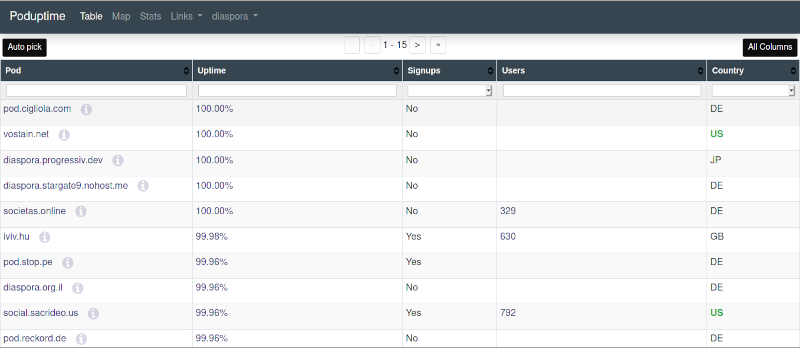Random Thoughts About the Federation/Fediverse
@gnufcl@fosstodon.org Saturday, 29th May 2021
Saying goodbye to centralized platforms
My first encounter with federated networks was through Diaspora. At the time, I was already aware of the harm caused by centralized, monopolistic platforms, both in terms of privacy and of power abuse. I had just shut down the Face*k account I was using during the Arab Spring, and started embedding the FSF logo in all my blog posts. My Diaspora account was hosted on an independently run server, a pod in Diaspora's terminology.

If you're new to the “Federation Universe” and want to learn more about federated networks, I suggest you visit the Fediverse Party and do some reading. Besides defeating mass surveillance and cutting down the monopoly of tech giants, decentralized platforms allow you to communicate with other interconnected networks without leaving yours. If you are a tech-savvy person and have the financial means to do so, you can run your own server and take control over your data.
Hubzilla - a decentralized platform with nomadic identities
Some years later, I came across Hubzilla and resolved to set up my own instance. Initially developed by Mike Macgirvin, Hubzilla is a powerful platform that provides far more than you would normally expect from a macroblogging network. Meanwhile, the project does not focus on social networking anymore, but rather on providing multiple services such as “content-management” and “cloud storage” with privacy in mind. I can also confirm this shift, since I have noticed that the amount of interactions within the Hubzilla community was not as significant as in other platforms such as Mastodon or Diaspora. But then again, this only reflects my own perception, others may have a different point of view.
You will find plenty of background information about Hubzilla and its creator in this interview conducted by Sean Tilley. Hubzilla can be customized in different ways to suit your particular needs. You can create a wiki for your internal team, offer loyalty coupons to your customers and restrict access to your offers section, make your posts disappear after a certain amount of time and customize your themes for a better user experience. Hubzilla comes with a bunch of addons that enables you to extend the amount of available features. You can turn-on the plugins for ActivityPub and OStatus if you wish to connect with people on Mastodon or GNU social for example. One of the top features is the “nomadic identity”, which allows you to make clones of your channels on other separate servers. That being said, I think that the major drawback of Hubzilla is the lack of extensive documentation on the web.
GNU social - back to the roots
GNU social, previously known as StatusNet, was created by the pioneers of free microblogging networks. The “stable” release only supports the OStatus protocol. In order to connect with other federated networks such as Mastodon, you will need ActivityPub, which you can get through the nightly branch. If you get stuck during the installation process, you can ask the community members for help on their IRC channel. I had some questions about ActivityPub and the configuration options, and they answered me very quickly. You may be running your own instance on a VPS or a shared hosting environment, chances are you want to install a custom theme. To do so, just clone the relevant repo, then simply adjust your “config.php” file by adding an entry for the new theme. I am currently using “Qvitter”, which adds a fresh look to my instance.

Mastodon - My favorite platform
At the time of writing these lines, Mastodon is my beloved federating social network. I joined an instance dedicated to free and open source software, and I really enjoy the interaction with the community members. Moreover, I feel that Mastodon offers a better user experience, both in terms of usability and visual design. The dark mode I am currently using is also very relaxing for the eyes. Unfortunately, there's not much I can tell you right now about Mastodon, because I'm still exploring the features to figure out how the stuff works.

A final Thought
Before you decide to launch your own Fediverse server, read the documentation carefully to check if your configuration meets the minimum requirements. For many platforms, a shared web hosting will not satisfy the prerequisites in terms of CPU processing, memory usage and access privileges. In most cases, you will need at least a VPS to get your own instance up and running. That's all for now, I hope you enjoyed this little introduction to the federated networks.